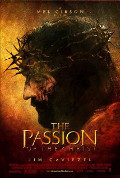
Directed by
Mel Gibson
126 minutes
Rated MA
Reviewed by
Bruce Paterson


The Passion Of The Christ
Synopsis: A violently bloody but ultimately redemptive account of the last twelve hours of Jesus Christ’s life.\Pas"sion\, n. [F., fr. L. passio, fr. pati, passus, to suffer.]. A suffering or enduring of imposed or inflicted pain; any suffering or distress; specifically, the suffering of Jesus Christ between the time of the last supper and his death, esp. in the garden, upon the cross.
There are many historical and scriptural versions of the last days of Christ and the religious and political power plays behind them. Mel Gibson draws his personal version from the Gospels, and, although historians now give greater responsibility for the crucifixion to the Romans, blames a group of Jewish priests for forcing the reluctant hand of Roman Governor, Pontius Pilate. The director is known both for his conservative Catholicism and a liking for the persecuted film hero and both these inclinations get full expression here.
The film has been branded as anti-semitic. In the context of historical and contemporary religious extremism, I cannot see a lasting prejudice against Jews or Judaism in the film. Some Jewish priests seek the death of Jesus for blasphemy. Other Jewish priests attempt to oppose them. Many Jewish people are seen to be compassionate towards Jesus, particularly in the powerful scenes where Simon helps to carry Jesus’ cross. Aspects of the narrative may offend those who understand history differently, but its intention is to communicate a perspective on suffering and faith. It is not a polemic on Christianity vs Judaism vs Roman paganism. In any event, Pilate’s dialogue in the film goes some way to acknowledging the difficulty of knowing truth.
History aside, this is a phenomenal story told with grim determination and authenticity. It begins with Jesus’ betrayal by Judas, and, after two hours of film-time covering the last twelve hours of Jesus’ life, ends with his scourged body lowered from the cross into the arms of John, Mary and Mary Magdalen. Along the way, visions of an androgynous Satan moving amongst the crowd suggest that perhaps those who persecuted Jesus were not solely responsible for their actions, but influenced by evil itself. The historical sense of the film is strengthened by the use of Aramaic and Latin instead of English, highlighting the perception of viewing events across a rift in time and culture.
Cinematographer Caleb Deschanel’s visuals go beyond even the most morbid Christian iconography. There is no Renaissance-inspired unscathed Christ on the Cross to emphasise sacrifice rather than the suffering. The Roman crucifixion was intended to exhibit degradation and humiliation through torture, and that is shown here in unrelenting detail. It is hard to believe Jesus survived his scourging in this film, much less struggle to the Cross - where he hangs covered in horrific wounds from the lashing, dripping with blood. The film is daubed with an earthy palette, and generally shot close rather than lingering on panoramic scenes. Throughout, the visual elements are well-matched by the impressive choral score, reminiscent of Scorsese’s The Last Temptation of Christ.
There is little to soften the journey other than brief flashbacks to the last supper and other scenes from Jesus’ life. There is little real character development. There is perhaps an excessive amount of slow motion camera work, possibly designed to capture Jesus’ inner perception of the whirlwind of events surround him. There are some overblown moments. There is little insight into Jesus’ personal charisma or teachings. But there is the reality of his sacrifice and his love, particularly the love shared between him, his disciples, his mother, and Mary Magdalen. The remarkable thing about the film is its capacity to realize the redemptive power of the spiritual sacrifice through the bloody and violent veil of physical reality. Jim Caviezel’s performance is pivotal – he may not say much, but he makes a huge emotional impact.
This is not a film for all, and definitely not for children or anyone who has difficulty with realistic representations of violence and anguish on screen. Yet it is an extraordinary testimony to a man’s suffering for his faith and Mel Gibson’s commitment to realizing his version of the Passion is breathtaking. The Passion Of The Christ is a significant and startling contribution to both cinema and our representations of the story of Christ.
Want something different?





